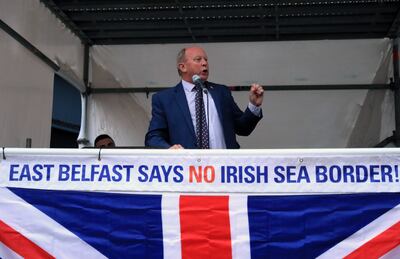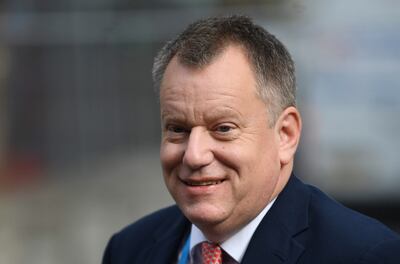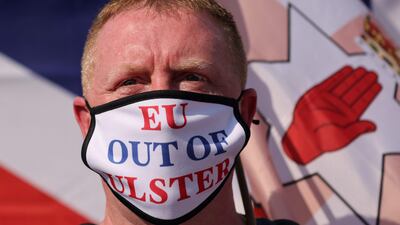The British government has signalled its willingness for a major dispute with the European Union to protect stability in Northern Ireland and the 1998 peace deal.
In possibly the most important post-Brexit speech to date, Lord David Frost explicitly declared that the British government would use the Article 16 clause to suspend the Northern Ireland protocol to protect peace and prosperity in the province.
In a specially arranged address, the Cabinet Office minister said London would put the Good Friday Agreement before the trade arrangement that enabled Brexit. That means Britain would be ruthless in its fight to overturn what it considers unfair elements of the deal agreed to with the European Union in 2019.
London would not tolerate the European Court of Justice as the place to decide trade disputes over the treaty, he said.
Lord Frost’s central argument was that the protocol had to be reformed to avoid potential civil unrest from the unravelling of the Good Friday Agreement that brought the Troubles in Northern Ireland to an end.
“We have a real opportunity to put in place a new arrangement to defuse the political crisis that is brewing, both in Northern Ireland and between us,” he said in the speech, given in Lisbon, Portugal.
The Northern Ireland protocol was introduced to avoid a hard border with customs controls between Northern Ireland and the Irish Republic. However, it essentially moved the border to the Irish Sea inhibiting imports from mainland Britain of many goods, including sausages.

Lord Frost said this invisible frontier was disrupting ordinary people’s lives, damaging businesses and “causing serious turbulence”.
The fundamental difficulty was that the UK had to “run a full-scale external boundary of the EU through the centre of our country, to apply EU law without consent in one part of it”, he said.
Goods should be allowed to circulate freely between Northern Ireland and the rest of Britain, “something that every other country in the world takes for granted”, he said.
Northern Ireland's unionist community views the protocol as a severe challenge to its unity with the rest of the UK and the matter has sparked some outbreaks of violence.
“We now face a very serious situation, it has completely lost consent in one community in Northern Ireland,” Lord Frost said, referring to the unionists. “It is not doing the thing it was set up to do, to protect the Belfast Good Friday Agreement, in fact it is doing the opposite. It has to change.”
He suggested that the protocol had been used malignly by the EU to reverse the Brexit vote or “keep us closely aligned with the EU” and that it was clearly “a moment of EU overreach”.
“The Northern Ireland protocol is the biggest source of mistrust between us and for all kinds of reasons, we need to fix this problem.”
The EU also took a heavy broadside from Lord Frost on its actions over the last year in which, he said, it arbitrarily banned the Oxford-AstraZeneca Covid-19 vaccine, imposed a “needless ban” on fish imports and France threatened to cut energy supplies. Britain had then faced “generalised accusations that we can't be trusted”, he said.
He argued that this undermined the 2016 Brexit vote itself, in which 52 per cent of British voters opted to leave the EU.
“To suggest there is something wrong in people deciding things for themselves is somewhat disreputable, maybe even disrespectful to the British people in our democracy,” Lord Frost said.

For the EU to say that the protocol, which was “drawn up in such haste” could not be improved upon, would be a “historical misjudgement”.
“It is our responsibility to safeguard peace and response and prosperity in Northern Ireland. That may include using Article 16 if necessary,” he said.
He suggested that an improved deal would bring about “a new age of co-operation in which the word 'protocol' never appears”.
The speech represents a serious challenge to the EU leadership and to its unity, with some countries eager for the protocol issue to be resolved while others, such as France, might veto any compromise.
The coming weeks of negotiation could be crucial in setting the terms for the Anglo-EU relationship for years to come.


